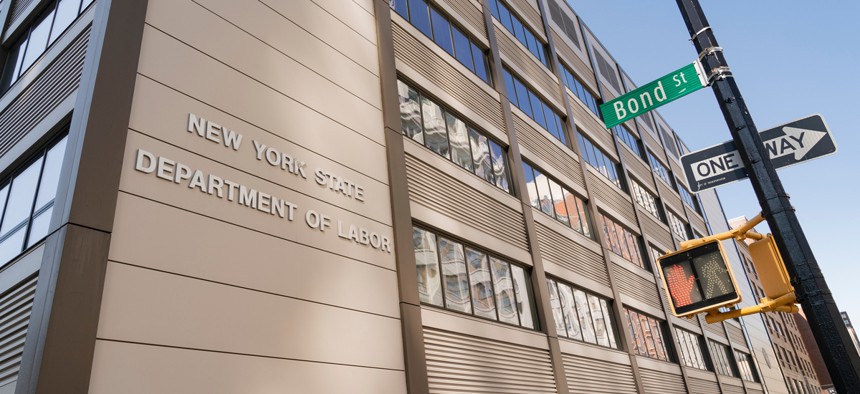States Overpaid Millions in Unemployment and Now Demand People Pay It Back

The Brooklyn office of New York State Department of Labor. Shutterstock/ Lev Radin
States rushed to get unemployment benefits approved when the pandemic struck. Reviews are now identifying millions of dollars in overpayments that they want workers to repay.
As millions of workers lost their jobs earlier this year, many states temporarily loosened their rules to apply for unemployment and began processing a record number of jobless claims.
But as claims soared, so too have accidental overpayments to out-of-work people that states are now trying to collect.
The process creates a devastating conundrum as the pandemic rages on—states want workers to repay money they were not eligible for, but many people remain unemployed and have no means to pay back the funds. In addition, some recipients of overly generous unemployment checks say state agencies made mistakes in calculating their eligibility and complain they should not be held financially liable for governments’ mistakes.
In Texas, officials estimate $261 million in unemployment overpayments were made. That’s compared to $73 million in overpayments made in 2019 when far fewer unemployment claims were filed, said James Bernsen, the deputy director of communications for the Texas Workforce Commission, which oversees unemployment claims. The state has sent out more than 231,000 notices to claimants believed to have received overpayments in an effort to collect the money.
Many states loosened requirements and waived week-long waiting periods for initial unemployment claims in an effort to process payments more quickly when the pandemic hit. But now as states have begun to review filings more closely, many are discovering discrepancies or new information that can alter the amount a worker is paid or their eligibility. Already, overpayment notices have been mailed to thousands of workers in Ohio, Pennsylvania, and Montana.
Some of the most common causes for overpayments include incorrectly reported wages or false information about job separations, said Cisco Gamez, a spokesman for TWC. Systemic fraud has also plagued unemployment filings this year across the United States as criminals have sought to profit from pandemic assistance, in some cases launching organized efforts to siphon millions in unemployment aid.
This has all come as many states have struggled to keep up with the demand for unemployment, with many people waiting weeks, and even months, to start getting benefits they are entitled to receive.
In New Hampshire, the state has identified $25 million in overpayments made to nearly 10,000 workers. The state erred in how it qualified many workers for state benefits, accidentally finding they should also receive the federal $600-a-week unemployment enhancement as well, said Sarah Palermo, spokeswoman for the New Hampshire Legal Assistance. But while the state has waived repayment of state unemployment benefits made in error, workers are still on the hook for the federal benefits that were deemed to be overpayments.
“We’ve seen cases where recipients have been ordered to repay thousands, in one case as much as $9,600, in federal unemployment benefits—with interest at 1% per month if not paid in full within 60 days of the state’s initial notice,” Palermo said.
The organization has received 214 calls for help with unemployment issues this year, compared to 27 last year. On Friday, the group held a training for private attorneys who are willing to take overpayment cases on a pro bono basis.
A spokesperson for the New Hampshire Employment Security did not return calls seeking comment. But the agency’s deputy commissioner, Rich Lavers, told the Union Leader newspaper that officials earlier in the pandemic wanted to get payments out quickly and not get held up on small paperwork issues or lengthy reviews.
“Neither the crisis itself nor the volume of claims we were handling allowed for a perfect process,” he said.
As states pursue repayment from workers, some have altered their protocols in an understanding that many workers may still be unemployed and in difficult financial situations.
Texas has suspended the practice of garnishing any future unemployment payments to collect overpayments and has forgone any interest on overdue payments.
“We have done this because we recognize how difficult it is to do this now,” said Bernsen, from the TWC. “We simply ask people to set up a payment plan to repay the money in the future.”
Andrea Noble is a staff correspondent with Route Fifty.
NEXT STORY: 12 Million People to Lose Unemployment Benefits This Month When Federal Programs Expire





